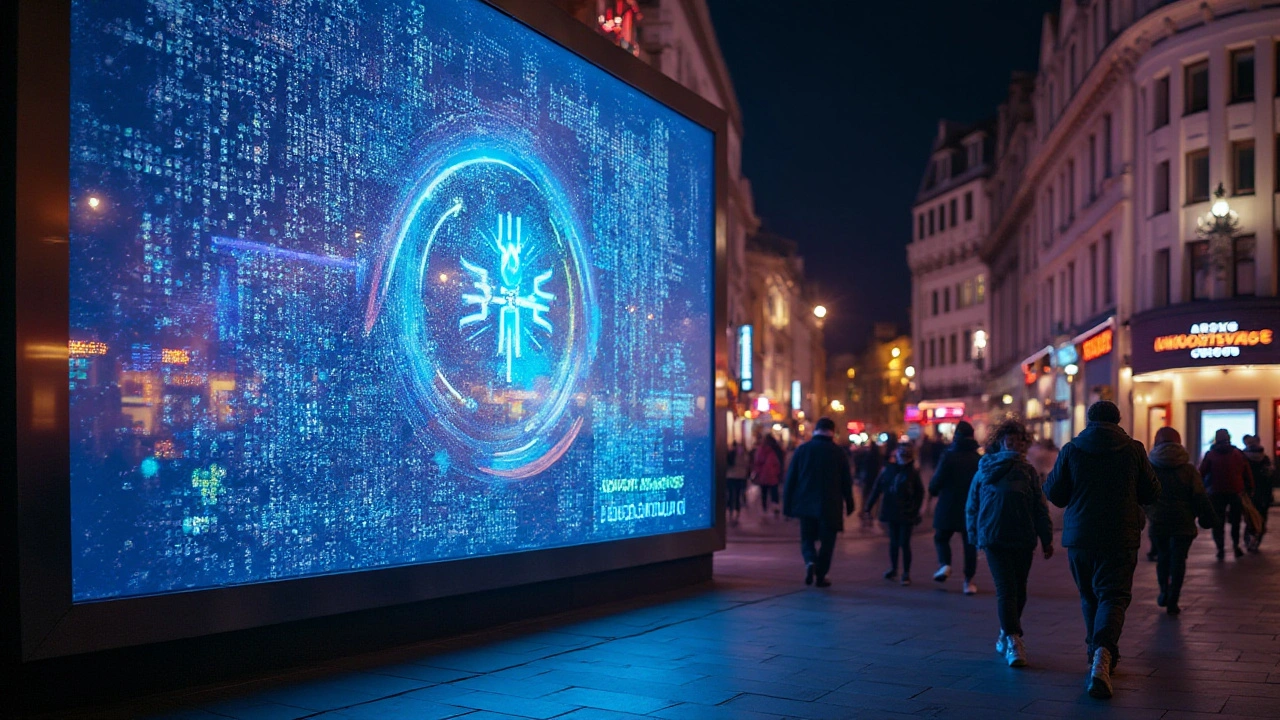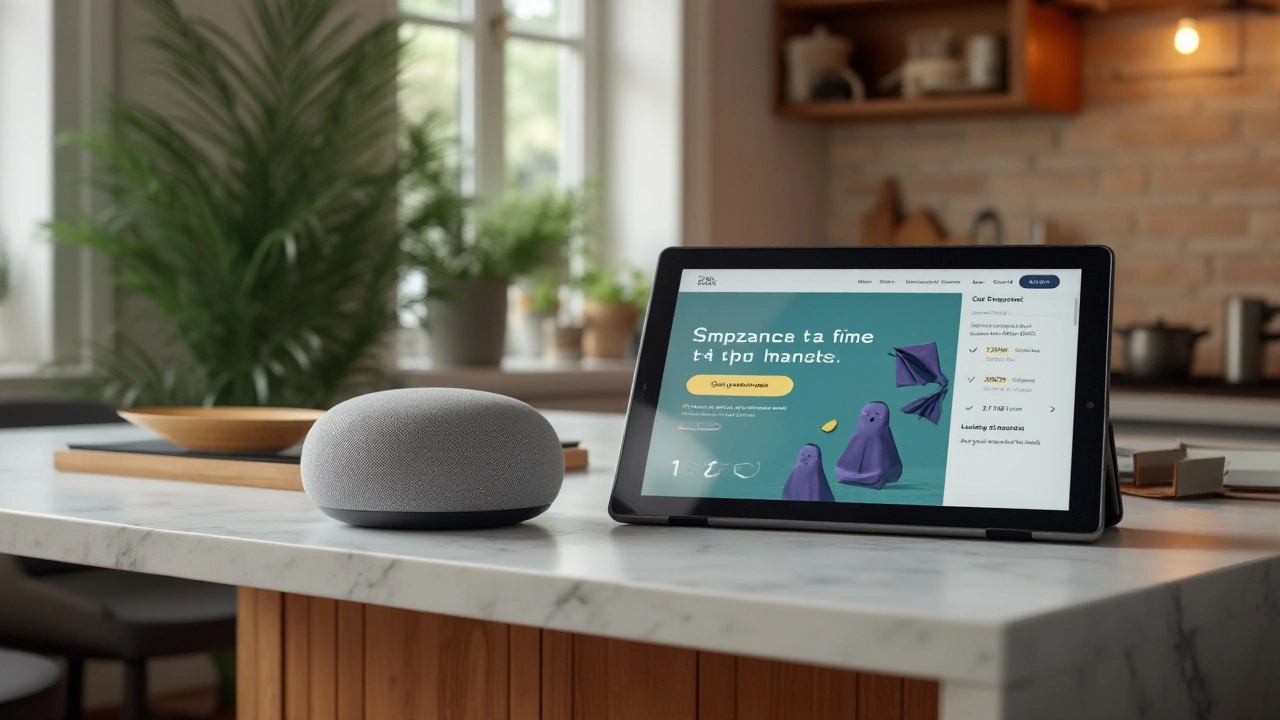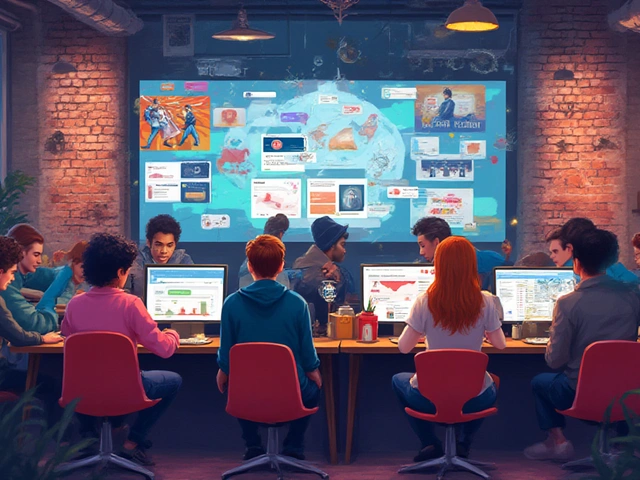The world of advertising is no stranger to change, but few innovations have stirred the waters quite like ChatGPT. As a thrilling player in the marketing realm, this AI marvel has been making waves by offering brands a powerful tool to connect with their audience in imaginative ways.
In an era where personalization is king, businesses are constantly on the lookout for technologies that can cater to individual customer experiences. ChatGPT steps up to the plate, revamping how content is created and delivered, ensuring messages resonate more effectively with their intended audience.
The journey of incorporating AI into advertising is as much about inventiveness as it is about looking critically at what technology can accomplish. The stories of brands successfully integrating ChatGPT into their marketing strategies paint a vivid picture of the future, one where creativity dances alongside technological prowess.
- The Emergence of ChatGPT in Marketing
- Personalization and Audience Engagement
- Transforming Creative Ad Copy
- AI in Action: Success Stories
- Future Prospects and Ethical Considerations
The Emergence of ChatGPT in Marketing
Over the past few years, the advertising industry has cautiously embraced the power of AI. Among these advancements, ChatGPT has stood out as a transformative tool whose impact on marketing strategies cannot be understated. Originating from research at OpenAI, ChatGPT initially aimed to enhance conversational AI capabilities. Yet, creative marketers quickly saw its potential to revolutionize how brands connect with their audiences. What makes ChatGPT particularly alluring is its ability to process and generate human-like text, allowing businesses to create interactive, engaging content that feels both natural and personalized.
The increasing adoption of ChatGPT in marketing reflects a broader shift towards personalization. As consumers become inundated with advertisements at every turn, there is a growing demand for content that resonates on a personal level. This AI enables digital marketers to deliver messages suited to individual preferences and behaviors, making interactions with brands feel tailored and intimate. The sophistication of ChatGPT allows it to adapt its tone and style to reflect the unique voice of a brand, all the while aligning with audience expectations, thus creating a seamless user experience.
As organizations began dipping their toes into this new technology, many wondered just how effectively AI technology could mimic human creativity. The results have often been surprising. Early experiments with ChatGPT in crafting advertisements demonstrated its potential to generate both catchy slogans and nuanced product descriptions with minimal guidance. Major brands quickly picked up on these possibilities, incorporating AI to draft emails, social media posts, and even comprehensive marketing campaigns.
Innovations in AI do not come without their challenges. The integration of ChatGPT into ads also raised significant discussions around authenticity and dependability. Would audiences trust content generated by algorithms—the realism of which was, ironically, its strongest feature? Yet, consumer feedback from preliminary campaigns using ChatGPT suggested a high rate of engagement and satisfaction. According to a study by AI industry experts, campaigns utilizing AI-driven content saw engagement rates improve by up to 30% compared to standard automated messages.
Given its impact, ChatGPT is becoming an indispensable asset in the toolkit of modern marketers. A quote from industry expert Clara Mason highlights this sentiment:
"AI in advertising isn't just about automation—it's about enhancing our understanding of human interaction and improving our ability to forge genuine connections with audiences."This perspective underscores the potential AI holds in significantly redefining customer experience and brand perception in the marketplace.
Personalization and Audience Engagement
In today’s digital world, personalization is not just a trend; it has become a necessity for brands seeking meaningful engagement with their audience. With the advent of AI technologies like ChatGPT, advertisers have found a potent ally in tailoring experiences that speak directly to individual consumer needs and preferences. This transformative approach allows brands to delve beyond generic messages, crafting communications that are not only relevant but also carry the potential to resonate deeply with each audience member. The power of AI in advertising lies in its ability to process vast amounts of data, which then informs the creation of personalized marketing strategies that feel both unique and intuitive.
AI-driven tools, such as ChatGPT, excel in extracting insights from customer behavior, preferences, and interactions. This information is key to developing highly targeted and customized content that enhances user experience, resulting in increased customer satisfaction and loyalty. By analyzing previous interactions and purchase history, brands can deliver timely and personalized recommendations that actively engage consumers. “Data-driven marketing is no longer a luxury but a must-have for retaining a competitive edge,” noted a recent study by McKinsey & Company, emphasizing the growing reliance on AI in crafting strategic marketing initiatives.
One of the core aspects of engagement through personalization is the creation of dynamic content that evolves with the user’s journey. ChatGPT offers a flexible solution by providing adaptive interactions that can modify conversation paths in real-time. This level of interaction not only keeps the consumer engaged but also fosters a sense of connection and understanding between the brand and its audience. A noteworthy benefit of using AI in this context is the ability to scale personalization efforts without significant increases in resource expenditure, making it accessible for both large and small enterprises alike.
Moreover, integrating AI into personalization strategies opens up avenues for real-time customer feedback and interaction, offering brands valuable insights into the consumer mindset. This loop of feedback and adaptation creates a robust ecosystem where advertising strategies are continuously refined to better suit consumer demands. The real-time nature of AI interactions also ensures that brands remain agile, capable of responding swiftly to market changes and consumer preferences, ultimately leading to a more engaged and loyal customer base.
To truly maximize the potential of AI in personalization, brands must navigate the delicate balance between leveraging data and respecting consumer privacy. A user-centered approach that emphasizes transparency and consent helps build trust, an essential element in ensuring that personalized content is perceived as helpful rather than intrusive. As technology continues to advance, brands need to remain vigilant, adopting ethical practices to safeguard the relationship they work hard to foster with their audience.
The journey towards effective personalization in advertising through AI is just beginning, and as more brands explore the possibilities, the implications for the way we consume advertising content will continue to grow. By understanding and implementing these emerging technologies thoughtfully, businesses position themselves to lead in the ever-evolving digital marketing landscape.

Transforming Creative Ad Copy
The role of ChatGPT in reshaping creative ad copy is nothing short of transformative. Gone are the days when copywriters had to rely solely on their imagination after a fresh cup of coffee. Today, this AI technology offers an endless stream of creativity, pushing boundaries and crafting messages that resonate deeply with audiences. By understanding nuances in language, ChatGPT brings a remarkable finesse to the table, allowing brands to communicate with their customers in a more engaging and meaningful manner.
At the forefront of this innovation is the ability to generate variations of ad copy that can be quickly tested across different platforms. This ability not only improves the efficiency of marketing teams but also increases the likelihood of finding the perfect message that speaks to the heart of the consumer. With ChatGPT, A/B testing becomes a less daunting task as the AI can effortlessly produce numerous alternatives, each tailored to a specific audience segment or platform.
Moreover, ChatGPT's capability to create ad templates enables a more streamlined creative process. Marketers can input basic parameters, such as the desired tone or specific product features, and the AI will generate copy that meets these criteria. This not only speeds up the initial copywriting stage but also ensures consistency across all advertising channels, maintaining a unified brand voice.
Enhancing ad engagement is another significant benefit that ChatGPT offers. By using its natural language processing capabilities, this AI tool identifies emerging trends and language patterns, allowing marketers to stay ahead of the curve. According to a report by Gartner, "AI in advertising will deliver 30% additional ROI by identifying and optimizing high-value advertisements." Such statistics highlight the potential impact that AI can have on advertising strategies.
Cathy Boyle, a senior analyst at eMarketer, stated, "As brands focus on personalization, AI technologies like ChatGPT will be instrumental in driving more personalized and therefore more effective advertising campaigns."
Nevertheless, it's essential for brands to maintain a balance between AI-generated and human-created content. While ChatGPT can automate much of the copywriting process, the human touch remains invaluable. Marketers must ensure that their brand's personality shines through the text and connects with the reader on an emotional level. This means using AI as a tool for enhancement rather than replacement.
It's clear that ChatGPT is not just enhancing how ads are written; it's changing the landscape of what is possible within the realm of creative marketing. As it continuously evolves, this tool will help brands not just speak louder in a crowded market but more intelligently and intimately. ChatGPT is indeed a groundbreaking development that is helping reshape the future of advertising one word at a time.
AI in Action: Success Stories
As the advertising world embraces ChatGPT, brands are discovering fresh and innovative ways to connect with their audiences. One remarkable story comes from a leading fashion retailer that leveraged this AI technology to transform its customer engagement strategy. By integrating ChatGPT into their ecommerce platform, the retailer created a virtual stylist capable of offering personalized recommendations based on shopper preferences. Customers interacted with the AI as if conversing with a knowledgeable friend, asking about styles, occasions, or current trends. This not only boosted sales but significantly enhanced customer satisfaction, leading to a notable increase in repeat purchases. As feedback poured in, users frequently praised the convenience and personalized attention, illustrating the profound impact of AI when woven thoughtfully into consumer experiences.
Another captivating instance involves an automobile company using ChatGPT to revamp its marketing efforts. The company faced the challenge of making their pre-sales engagement more impactful and engaging. By implementing ChatGPT, they were able to simulate real-time conversations, answer complex queries related to models, features, and even financing options. This level of interaction provided potential buyers with a seamless experience, ultimately reducing the decision-making time and improving conversion rates. The essence of real-world conversations, delivered through digital means, forged a new path for consumer trust and brand loyalty. As a spokesperson from the company highlighted,
"ChatGPT has enabled us to connect with our customers on a personal level, something we've aimed for over the past decades."
Innovative Ad Creation
Beyond customer engagement, ChatGPT is revolutionizing the creation of ad content with creative vigor. An upcoming tech startup triumphed in cutting through the competitive noise by harnessing this AI tool to craft precise and emotionally resonant ad copies. The use of ChatGPT facilitated the crafting of various ad formats rapidly, helping the company to test different messaging and appeal to diverse audience segments efficiently. Consequently, they observed an increase in click-through rates and an uptick in customer inquiries, proving the powerful synergy between creativity and AI-enhanced advertising. This kind of innovative approach is allowing even small brands to compete with industry giants, demonstrating how marketing innovation can level the playing field and democratize access to effective advertising strategies.
Such success stories provide a glimpse into the potential AI technology holds for revolutionizing the advertising industry. Let's not forget the power of data-driven insights these applications offer. In a recent survey conducted across multiple industries, companies using AI-enhanced tools reported a 20-40% improvement in return on advertising spend (ROAS). These numbers validate the strategic value of AI, encouraging more brands to embrace this transformative journey. With AI at the helm, the future landscape of advertising promises to be more tailored, effective, and vibrant than ever before, opening doors to engaging customer experiences and redefined brand storytelling.

Future Prospects and Ethical Considerations
The future of ChatGPT in the realm of advertising holds tremendous promise, yet it beckons a reflection on moral grounds. Picture a world where AI crafts not only the skeletal framework of ads but fills them with hues of personalization that were once unimaginable. Marketers foresee a future where AI-generated content blends seamlessly with traditional creativity to produce campaigns that are both innovative and highly relevant to each consumer. This capability to understand and predict consumer behavior by analyzing large datasets has enormous potential. However, it raises questions about privacy, consent, and the extent to which consumers are comfortable with this level of scrutiny.
One fascinating prospect for ChatGPT is its ability to simulate human-like interactions at scale, often indistinguishable from actual human responses. These capabilities could shift the advertising industry towards a model that is more focused on interactive experiences rather than static content. For instance, brands could use ChatGPT to create virtual brand ambassadors that interact with consumers in real-time, offering assistance, building loyalty, and collecting feedback.Marketing innovation can be supercharged through these technological advancements.
The ethical dimension, though, cannot be ignored. The idea of an AI analyzing personal data to predict desires treads a fine line. In the words of Tim Berners-Lee, inventor of the World Wide Web, "It’s crucial we get this right... we’ve got to balance innovation with respect for users' privacy."
"The biggest challenge will be ensuring transparency in how data is used and maintaining a level of honesty that respects user intent." - Expert Analyst
Implementing ethical AI in advertising also involves the consideration of bias. Algorithms learn from data, and if that data contains biases, the AI will also reflect those. This extends to societal inequalities reflected in how ads are targeted or who is represented in them. Brands will need to vigilantly monitor AI outputs to ensure they align with the brand’s ethical standards and broader social responsibilities. Businesses that navigate these ethical challenges successfully will likely see significant consumer trust and engagement benefits over the long term.
Moreover, the debate on regulatory measures is growing louder. Striking a balance with regulations that protect consumer rights without stymying innovation is key. It appears that comprehensive policies and universal standards might be needed to guide the use of AI in advertising effectively. As near-term solutions, companies are investing in creating teams dedicated to ethical AI practices, ensuring that these technologies are implemented responsibly. This dual focus on advancing technology and fostering ethical awareness will shape the landscape in coming years, ensuring that AI like ChatGPT remains a robust ally in the world of advertising.




Write a comment